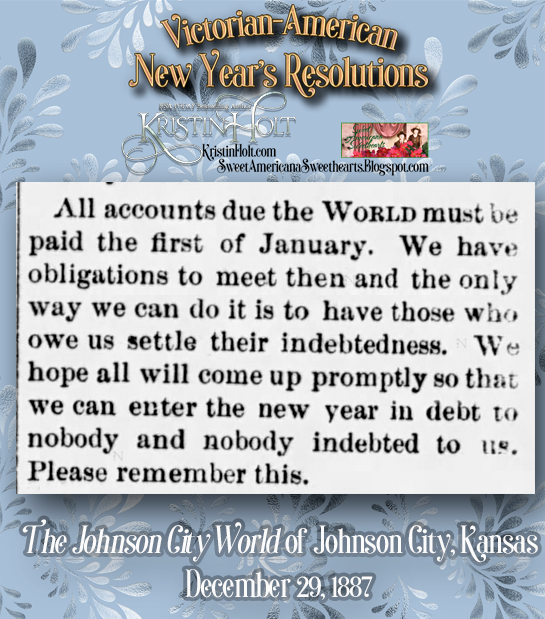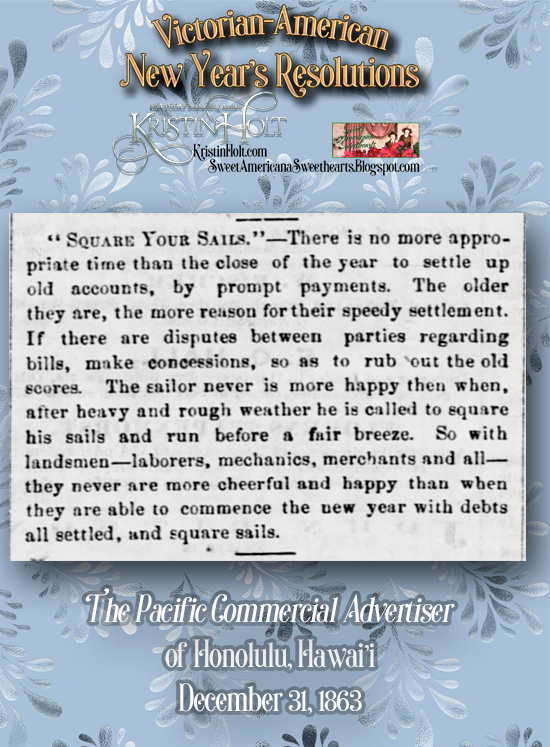by
Kristin Holt,
USA Today
Bestselling Author of Sweet American Historical Romance
Happy New Year!
Some matters might be wildly different now than back in the nineteenth century, yet some things haven’t changed. Like human nature. And the resolve to do better.
This clipping, from The Times of Philadelphia (December 31, 1875) encapsulates one view of the Victorian-American values surrounding New Year's and resolutions:
Quit Smoking – then and now
Given all we know
about tobacco use in the nineteenth century, it’s no surprise people have both
loved and hated the “vice.” This 'tale' rings true in 2021 as much as it did historically.
Note this quip from 1869:
New Year’s Resolutions, Nineteenth-Century Style
Through the lens of vintage newspaper articles, Victorian attitudes about relationships, indebtedness, and substance use are apparent. Many New Year’s editorial posts and syndicated articles make the writers’ opinions clear—be sober, be wise, be prudent. And whatever you do, don’t drag the old year’s problems into the new.
Show Me the Money
No matter how many fictional tales I’ve read (set in the nineteenth-century American West), I’ve yet to see the financial “norm” appear. That “norm” is the abundant use of credit. Yes, the roughly-dressed newcomer to town might have to plunk down a coin on the bar before he’s allowed to run a tab, but what about the grocer? Or the furniture maker?
Did you know buying on credit was standard business?
People ran up tabs and paid them biannually. As a holdover from English customs and law, nineteenth century U.S. residents bought all year long on a running tab. These bills from the milliner, cobbler, grocer (etc., etc.) came due on July 1 and January 1. Not only did merchants want the money owed to them, but those merchants in turn needed to pay their suppliers.
Frequent newspaper editorials reminded readers to pay their newspaper subscriptions (in arrears), pay their parsons, pay their debts to all they owe. This tradition lasted throughout the nineteenth century.
Cultural Pressure
In poetry, no less.
I discovered numerous newspaper inclusions of New Year's poetry that bemoaned debts coming due. Here is an example:
And one more, for kicks:
Viewed through the lens of twenty-first century political correctness, much of the Victorian Era is cringe-worthy. Statements made about those “other” than native English-speaking protestant whites, at the time, were not only acceptable but prolific. Note this one that both praises and demeans (or does “heathen” simply mean not-Christian?) the Chinese:
Societal pressures insisted a man couldn’t welcome the New Year while encumbered with unresolved issues. Social mores, strong as they were, carried over into “stories,” caged as Cautionary Tales (Moral of the Story) and consuming column after column in newspapers across the United States.
The Russell County Record of Russell, Kansas, ran a lengthy piece like this. Titled “The Happy New Year,” on December 31, 1874, a Mr. Ellis—who could be any one of a million middle-aged husbands and fathers—learns a painful and humiliating lesson. Pay. Your. Debts. Oh, and even more important: Live Within Your Means. This “fictional” fellow is far from content with his income, buys on credit, dreads the “New Year’s Bills,” and even though he’s taken on a wife (and subsequently brought about five cherubic children) can’t find his way out of financial purgatory without his neighbor’s voice of reason:
“Oh, dear, what a miserable life it is! And I must still keep the grocer’s pass-book going, or starve.” (...bemoans Mr. Ellis)
“Cash down! It must be cash down!” exclaimed the neighbor. “There is no other hope for you!”
“But where is the cash to come from?”
“Reserve enough from the payment of bills to keep your table and pay your servants’ wages. Take your wife fully into your confidence. Lay your affairs all open before her. Put the money needed for expenses into her hands, and ask her to make it go as far as possible. Spend nothing yourself. In fact, don’t carry money about you. It is a temptation.”
You Deserve Smooth Sailing
Nineteenth century mores insisted a man couldn't be happy unless in charge of his own finances. Note this effective comparison between "squaring the sails" and freedom from financial bondage:
Fix Your Marriage
Shudder.
To consider a New Year dawning in debt is nothing, compared to the dread of carrying a dying relationship across the threshold of January 1. Another lengthy moral-filled story graced several columns in The Western Call of Beloit, Kansas on December 30, 1881. (syndicated from Ballou's Magazine)
Long story made short, a newlywed couple struggles with finances because he insists on economy and she insists he’s selfish. The joy of last New Year’s Eve when they met and began courting rankles this aggravated wife, and before she knows it, she’s pushed her loving (if frustrated) husband away. He informs her he can’t live like this, and he leaves her for two long years. During this time she transforms into an economizing and hardworking farm owner (not just a farm wife), whereupon his return, they reunite and are well-suited (because of New Year’s resolutions?).
Mend Friendships
Tucked within an 1876 article covering etiquette of New Year's Calls (at-home visits), this gem expresses the essence of New Year's-- reconciliation.
Invitation
Are you surprised by Victorian-America's social mores regarding debt and the New Year?
Please scroll down and share your thoughts.
Related Articles
More from Kristin Holt
Copyright © 2021 Kristin Holt LC





















No comments:
Post a Comment